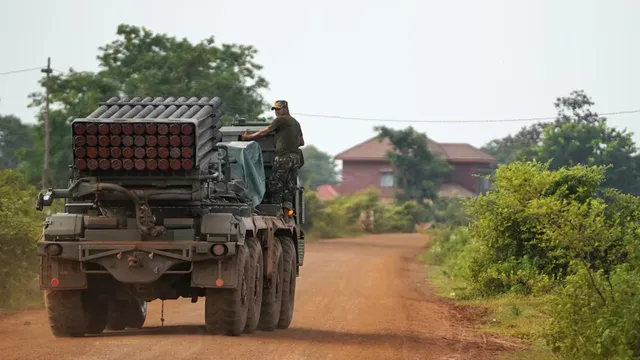- By Supratik Das
- Sat, 26 Jul 2025 08:02 AM (IST)
- Source:JND
Thailand-Cambodia border dispute: Cambodia has urged an "immediate ceasefire, unconditionally" with Thailand after two days of heavy cross-border fighting that have killed at least 20 people and made over 130,000 civilians homeless, officials confirmed on Friday. The centuries-old border conflict boiled over into the most serious military clash between the Southeast Asian neighbors in more than a decade, triggering an emergency session of the United Nations Security Council.
Addressing reporters after the closed UNSC meeting, Cambodian UN Ambassador Chhea Keo called for peace. “Cambodia asked for an immediate ceasefire — unconditionally, and we also call for the peaceful solution of the dispute,” Keo said. Thailand has been receptive to talks. Thai Foreign Ministry Spokesman Nikorndej Balankura said in a statement to AFP that Bangkok was prepared for bilateral or regional discussions and appreciated efforts at mediation, including that of Malaysia, ASEAN's chair.
Death Toll Mounts as Rockets and Artillery Shell Border Regions
Heavy artillery fire started again at the beginning of Friday, with clashes reported in 12 spots along the border. Thai forces blamed Cambodian troops for employing artillery and Russian BM-21 rocket launchers to strike military and civilian areas, such as hospitals and schools. Thailand's health ministry reported 19 of its nationals killed, 13 civilians and six military, and at least 62 wounded. One civilian death was confirmed by Cambodian officials in Oddar Meanchey province, and five injuries. Yet, unofficial figures indicate higher casualties on both sides.
Thailand's armed forces retaliated with F-16 attacks on Cambodian army positions, highlighting its advantage in aerial combat. Cambodia, which does not possess fighter jets, has blamed Thailand for "unprovoked military aggression" and destroying the 11th-century Preah Vihear Temple, a UNESCO World Heritage Site, which Bangkok denies.
Thousands Of Refugees Escape Conflict Areas, Humanitarian Crisis Intensifies
More than 138,000 civilians have been evacuated from the northeastern provinces of Thailand, and almost 300 shelters have been established in Surin and surrounding regions. Cambodian towns such as Samraong witnessed families fleeing amidst the sound of gunfire. "We heard very loud explosions, so we came here. We were so scared," said Aung Ying Yong, 67, a Thai evacuee who has taken shelter in Surin. Children romped outside the camps as older evacuees lined up for food and blankets donated by volunteers.
ALSO READ: Indian Embassy In Thailand Issues Travel Advisory As Thailand-Cambodia Border Clashes Leave 14 Dead
Tensions escalated following Thailand's expulsion of Cambodia's ambassador and its own envoy back from Phnom Penh, after a Thai soldier lost a leg in a landmine explosion close to the disputed area. Bangkok blamed Cambodia for laying the device, which Phnom Penh denied. Cambodian Prime Minister Hun Manet had stated that the two nations agreed to a ceasefire plan suggested by Malaysian Prime Minister Anwar Ibrahim but reported that Thailand changed its position only an hour afterward. Thailand said it would consider the proposal subject to "appropriate on-the-ground conditions.". The Thai Foreign Ministry blamed Cambodia for "barbaric acts" and suggested the use of cluster bombs against civilians. Cambodia denounced the use of these weapons as an international law violation. Thailand, which has not signed the Convention on Cluster Munitions, maintained that it was in conformity with proportional use to only military targets.

